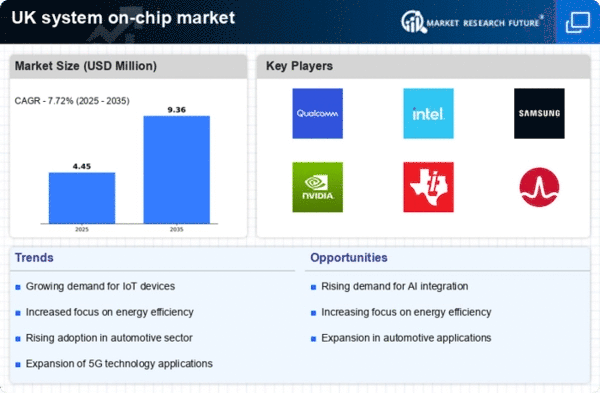Growing Demand for Mobile Devices
The proliferation of mobile devices in the UK is significantly influencing the system on-chip market. With an estimated 80% of the population owning smartphones, the need for efficient and powerful chips is paramount. The system on-chip market is responding to this demand by developing integrated solutions that combine processing power with energy efficiency. The market for mobile SoCs is projected to reach £5 billion by 2026, driven by the increasing use of mobile applications and services. Additionally, the rise of 5G technology is further propelling the need for advanced system on-chip solutions that can support higher data rates and improved connectivity. This growing demand is likely to shape the future landscape of the system on-chip market.
Focus on Enhanced Security Features
In the context of rising cybersecurity threats, the system on-chip market in the UK is placing a greater emphasis on enhanced security features. As devices become more interconnected, the potential for vulnerabilities increases, prompting manufacturers to integrate advanced security measures into their SoCs. This includes hardware-based security solutions, such as secure enclaves and encryption capabilities, which are essential for protecting sensitive data. The market for secure system on-chip solutions is anticipated to grow by 10% annually, driven by regulatory requirements and consumer demand for privacy. This focus on security is likely to shape product development strategies within the system on-chip market, as companies seek to differentiate themselves in a competitive landscape.
Expansion of Smart Home Technologies
The rise of smart home technologies in the UK is creating new opportunities for the system on-chip market. As consumers increasingly adopt connected devices, the demand for efficient and reliable system on-chip solutions is growing. The market for smart home devices is projected to reach £3 billion by 2025, with system on-chip solutions playing a crucial role in enabling seamless connectivity and functionality. This trend is prompting manufacturers to develop SoCs that can support various protocols and standards, ensuring compatibility across devices. The expansion of smart home technologies is likely to drive innovation within the system on-chip market, as companies strive to meet the evolving needs of consumers.
Advancements in Semiconductor Technology
The system on-chip market in the UK is experiencing a notable surge due to advancements in semiconductor technology. Innovations in fabrication processes, such as FinFET and SOI technologies, are enabling the production of smaller, more efficient chips. This has led to a projected growth rate of approximately 15% annually in the sector. As devices become increasingly compact and powerful, the demand for high-performance system on-chip solutions is expected to rise. Furthermore, the integration of advanced materials, such as graphene and silicon carbide, is enhancing the performance and thermal management of chips. This trend is likely to drive investments in research and development, fostering a competitive landscape within the system on-chip market.
Increased Investment in Automotive Electronics
The automotive sector in the UK is undergoing a transformation, with a marked increase in the adoption of electronic systems. This shift is driving the system on-chip market, as vehicles become more reliant on advanced electronics for functionalities such as autonomous driving and infotainment systems. The market for automotive SoCs is expected to grow at a CAGR of 12% over the next five years, reflecting the rising demand for integrated solutions that enhance vehicle performance and safety. As manufacturers invest in research and development to create innovative automotive applications, the system on-chip market is likely to benefit from this trend, leading to enhanced collaboration between automotive and semiconductor companies.















